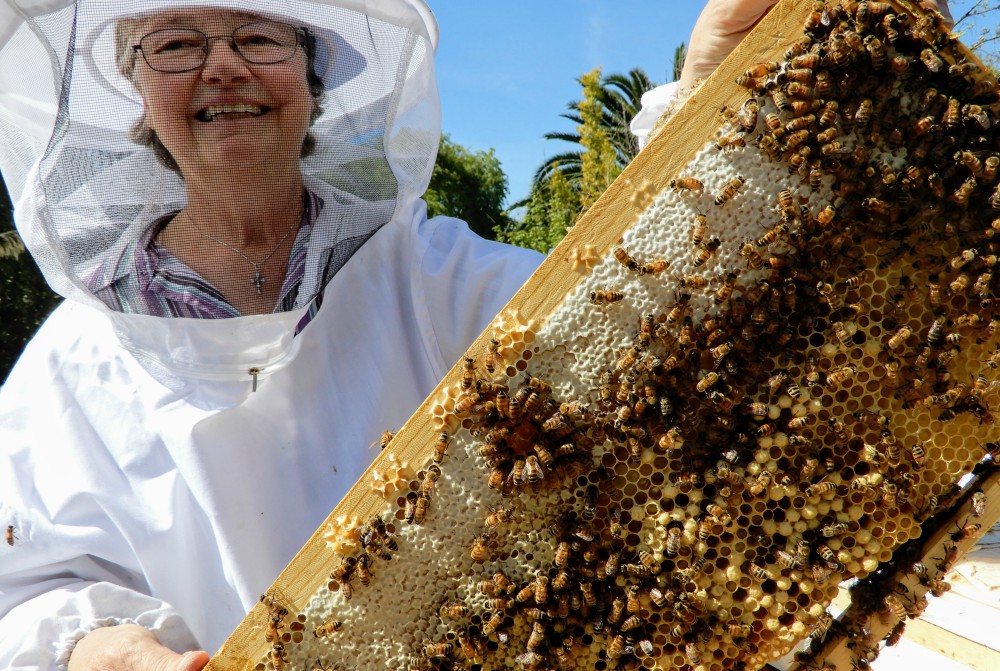
Sr. Barbara Hagel with a frame from one of her hives on the property of the Dominican Sisters of Mission San Jose in Fremont, California. All of the bees in a hive are genetically related to the queen, making all of the worker bees sisters. (Melanie Lidman)

A few times a week, Sr. Barbara Hagel of the Dominican Sisters of the Queen of the Holy Rosary suits up in a very different type of veil, a mesh facemask that zips to a large white jacket known as a bee suit. Carefully, she reaches in to check on one of the 13 beehives on her property. As she pulls out a frame of honeycomb, it vibrates with bees, a frenetic mass of activity shimmering in black and gold.
Hagel said it can be a spiritual moment, the first glimpse of the bees dancing over honeycomb cells.
"I'm constantly in awe of what I see and what is happening with the bees, and how the more I learn, the more I think about how God made this so incredibly complex and beautiful," said Hagel, who serves as the Care of Creation and Sustainability coordinator for her congregation, which is also referred to as the Dominican Sisters of Mission San Jose.
The world celebrates Earth Day on April 22 in the shadow of a global pandemic. This year is the 50th anniversary of the original Earth Day celebrations that birthed the modern environmental movement, though the realities of the COVID-19 outbreak will push most of the celebrations and demonstrations online.
With the widespread collapse of bee colonies and the danger this poses for ecosystems, beekeepers are a small but essential part of the larger fight against climate change.
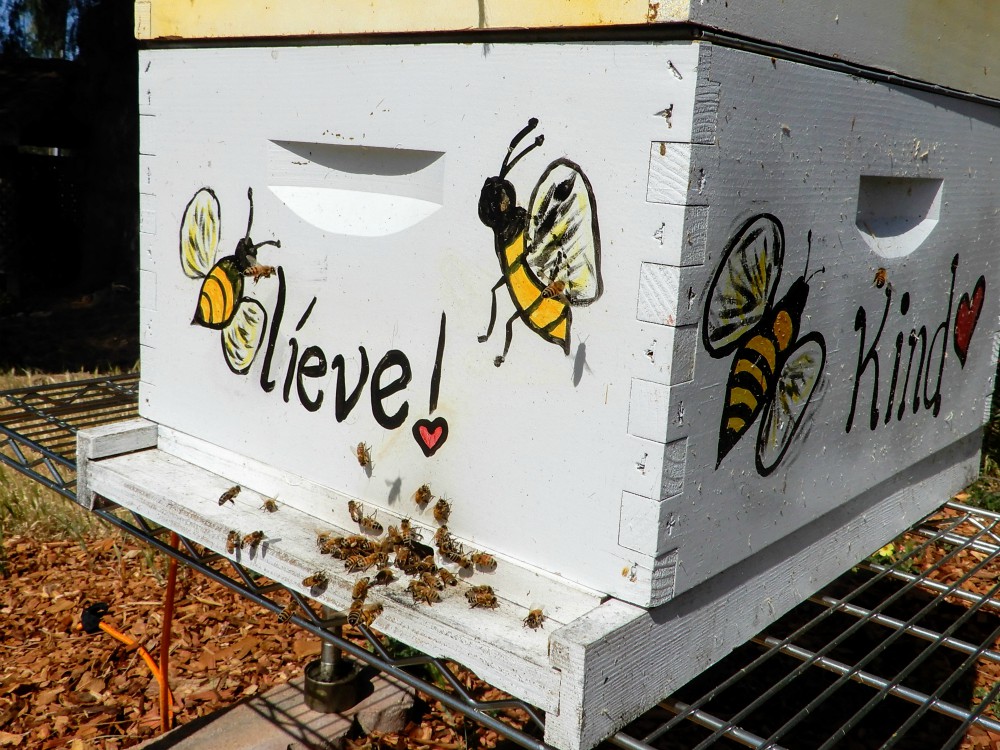
You can tell a lot about a hive by observing the bees coming in and out, Sr. Barbara Hagel says. (Melanie Lidman)
Back to their roots
When the Dominican Sisters of the Queen of the Holy Rosary first arrived at the San Jose Mission in 1891, beekeeping was a normal part of their work. Congregations were self-sufficient agricultural enterprises, and the Dominican sisters were no different. They had more than 250 chickens and hundreds of fruit trees in their orchard, and three enormous wells to water their crops. Beekeeping in the late 1800s and early 1900s was a mostly hands-off activity, because bees required little oversight before pesticides and foreign insect infestations, Hagel explained.
After years of concentrating on schools and education projects, in the past two decades the Dominican Sisters of Mission San Jose have made a concentrated shift back to organic farming projects and environmental causes.
"Much of what we're doing right now, we inherited from older sisters in the past," said Sr. Jeanette DeYoung, a registered nurse who also assists with agricultural projects.
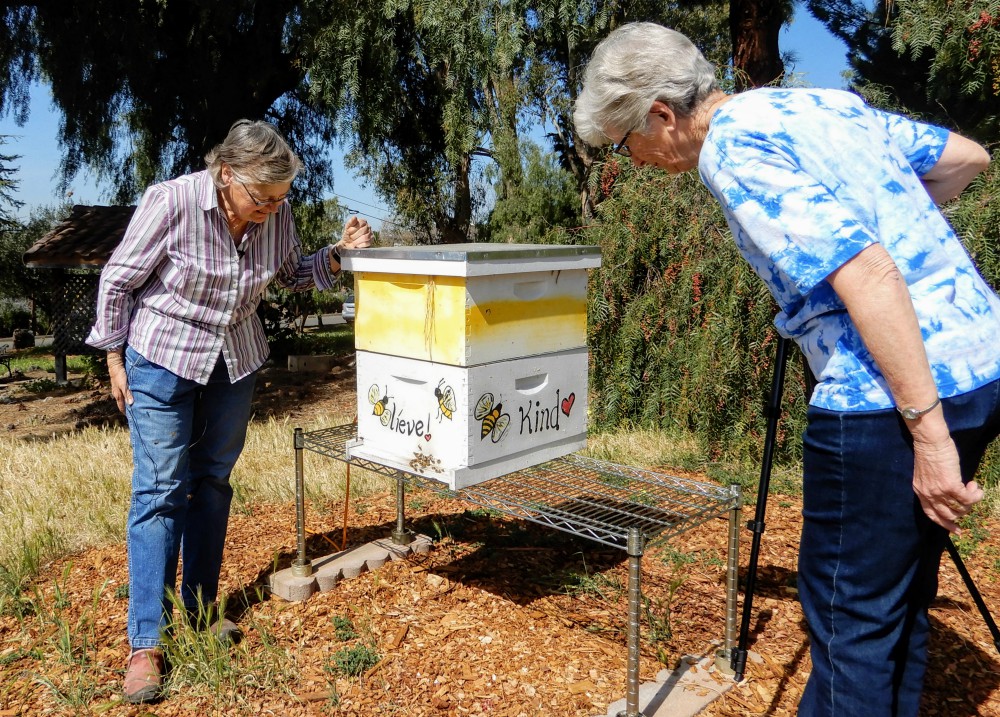
Dominican Srs. Barbara Hagel, left, and Jeanette DeYoung examine a beehive on their motherhouse property in Fremont, California. (Melanie Lidman)
'Bees have a very definite structure and congregations have very definite structures.'
—Sr. Barbara Hagel
Hagel has served as the creation and sustainability coordinator since 2013. In this position, she has helped oversee the transfer of 173 acres of sisters' property in the Santa Cruz Mountains into a protected land trust so it can never be developed, as well as local community garden projects, sustainable construction practices and an extensive recycling program.
DeYoung helps her with the congregation's sizable organic garden and the bee work, which includes checking of hives for things like mite infestations weekly and harvesting the honey a few times a year.
The congregation is also shifting its landscaping from vast tracts of rolling lawns to more wild and native pollinator meadows, which are drought tolerant and can help provide habitats for local wildlife and even more flowers for hungry bees. Horticulturist and landscape architect John Greenlee, who designed the project, has called the pollinator meadow conversion "a one-garden-at-a-time revolution."
Making a change in a small space
DeYoung said that the congregation's shift toward environmental projects and organic farming practices over the past decade has been a natural response to growing awareness of climate change.
"Part of it was seeing what other people were doing, both on the positive side and the negative side," said DeYoung.
Advertisement
Part of it was also watching some of the land around them slowly destroyed by commercial farms. Fremont is surrounded by housing developments that seem to sprout overnight and by farmland, where commercial farms plant a single crop as far as the eye can see in a farming practice called "monoculture." This type of commercial farming requires enormous amounts of pesticides and can have dangerous consequences for land, including soil degradation, because farmers are constantly planting the same crop in the same place without allowing for the natural renewal of nutrients in the soil that comes with rotating crops or growing a variety of crops.
"We had the ability to do something positive in a smaller space," said DeYoung. "And I think part of it was encouraging other people to do the same thing, like the volunteers that come here. One Indian man who just lives a few blocks away, he came specifically to learn how to do gardening, how to plant things, how to work with things out in nature, including the bees and the fruit trees. And after working about a year with us, he went home and did the same thing in his backyard, which I thought was a very good reason to do this."
"The first group that's affected by [the climate crisis] are the poor and the vulnerable," said DeYoung. "And in our constitution, this is one of our main objectives, doing what we can for the poor. Doing these gardens, even though it's on a smaller scale, is helpful to those groups."
The sisters are currently in the process of organizing gardening plots for the families living in a subsidized housing development across the street.
"So many of the people around here also very well-off," said DeYoung, referring to the wealth concentration around nearby Silicon Valley. "It's important to support the vulnerable, but it's also important to support the wealthy, because in a lot of ways, they're the ones that make the decisions about what your community is going to do and how we're going to spend our funds.
"So I think it's important that you touch the people who are in need of help, but also touch the people that are better off that might be able to do more to change things."
Bees are a natural extension of organic gardening, because their presence is so vital for the success of gardens and the ecosystem in general. The United States has lost almost half of the country's honeybee colonies in past decades, from 5 million managed colonies in the 1940s to 2.67 million in 2019, according to the U.S. Department of Agriculture.
Bees are a vital part of the country's economy, adding $15 billion to agriculture per year, and they are directly responsible for pollinating about one out of every three bites of food you put in your mouth.
In 2006, the USDA identified "colony collapse disorder" when entire colonies of bees died suddenly, linking it to pesticide use. Between pesticides and the arrival of foreign insects such as the varroa mite, it is increasingly difficult for bees to survive in the wild without human intervention to stave off infestations. That makes commercial and private beekeepers one of the last lines of defense in protecting crops and food production.
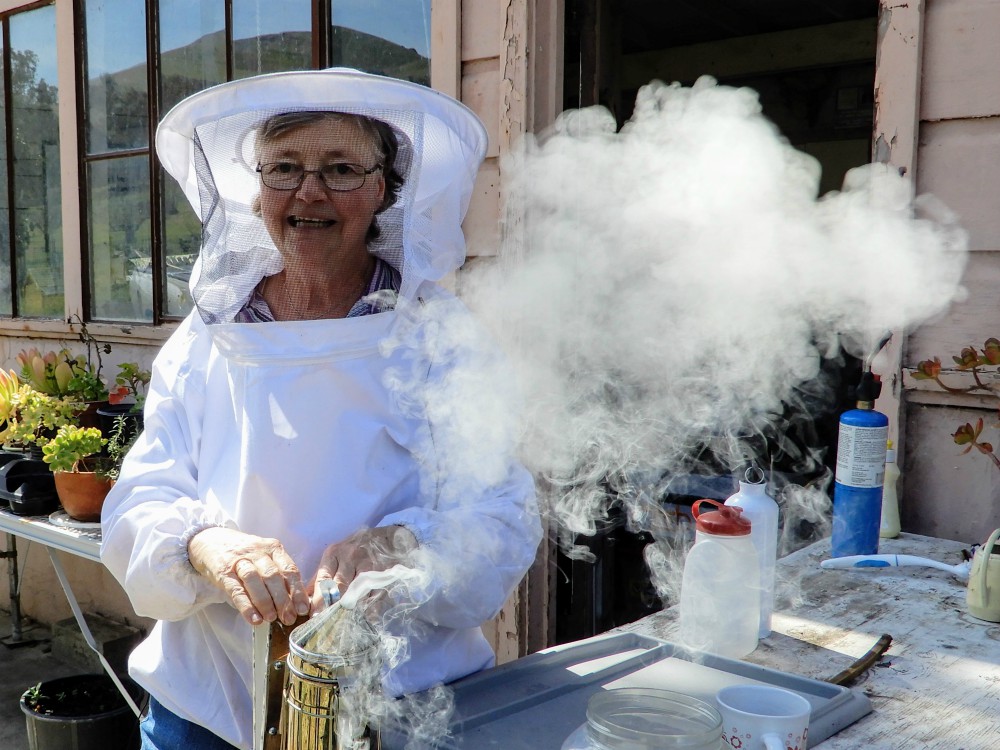
Sr. Barbara Hagel prepares the smoker, which calms the bees and allows beekeepers to safely access the hive. (Melanie Lidman)
'All the bees in the hives are sisters'
For the ultimate example of living in community, Hagel just needs to walk to one of her hives, which are brightly festooned with bee puns like "Bee amazing" and "Bee creative."
"It's actually the hive that is considered the organism, the entire swarm, not just the single bee," she said, pointing out a forager bee who had come to alert her mates to a good source of pollen with an intricate wiggle dance on one of the frames Hagel has pulled. "It's a beautiful example of community. They work together; they'll give their life for the group."
Every bee in the hive is genetically related to the queen, making all of the bees sisters. Bees can teach congregations a lot about living and working together, she said. "Bees have a very definite structure and congregations have very definite structures."
"When you have too much division and too much separation, the community doesn't fare well. With the bees, they always cooperate, everyone has a job and everyone does their job. They even have a mortician."
During a bee's lifetime, each bee will produce one-sixth of a teaspoon of honey, which has taught Hagel to honor the contribution of each and every bee.
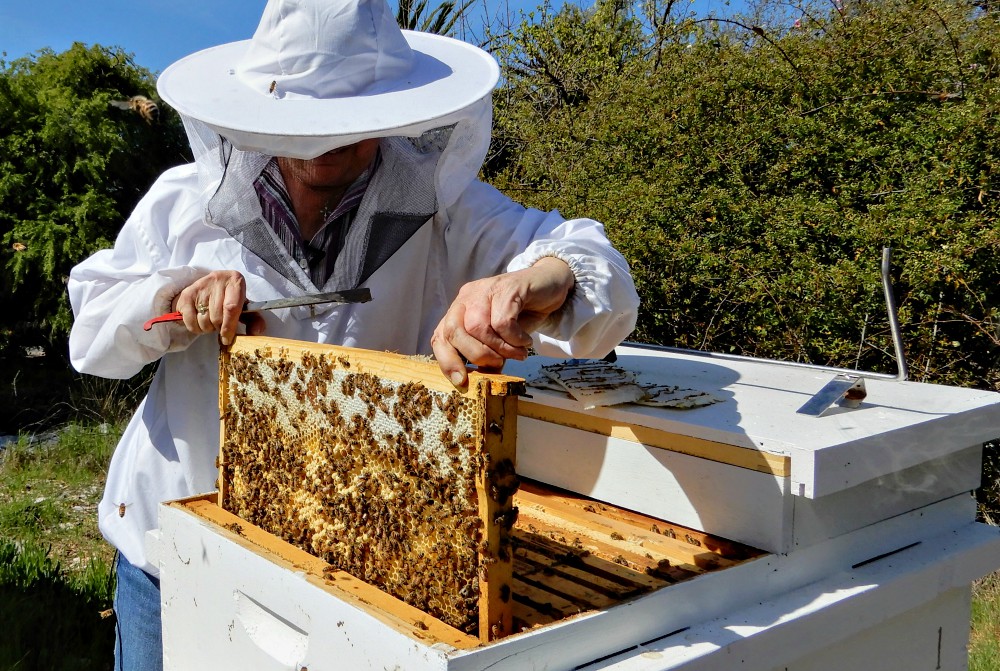
Sr. Barbara Hagel pulls a frame out of an active hive. (Melanie Lidman)
"Everybody in the hive can get what they need," Hagel added. "There are no bees in the hive that live in this section, and we live in this section, and we have all the money and they don't, or we have all the honey and they don't. Everybody is cooperating, and it's a community that depends on each other and they know that."
Especially on Earth Day, in the midst of a global crisis, humans could learn a lot from the bees, said Hagel.
"That sense of community, of being interdependent, of being beyond ourselves … that willingness to share, that willingness to move beyond this present moment and investing in a future that's rich and beautiful and going somewhere," she said, pausing to take off her veil and put away her bee equipment.
"We're always going somewhere because evolution always goes forward. You can't stop it; it's always going forward to a bigger and a better place. It does give me a little bit of hope."
[Melanie Lidman is a freelance journalist in California and was formerly the GSR Africa and Middle East correspondent.]






